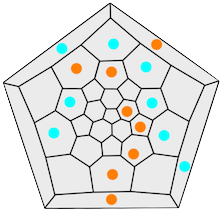I do not use many games in my teaching. (On the other hand, I do use lots of puzzles!) On this page, I link to games and game-like activities I have used.
Numbers
Signed Numbers: an onscreen game where students practice signed number arithmetic, test their understanding of decimals, and improve their estimation skills.
Complex Numbers: This is the same game for complex arithmetic. Rectangular form for addition and subtraction, polar form for multiplication and division.
Pentomino Games
Basic game: two players take turns placing the pentominoes from one set on an 8⨉8 board. The first player who is unable to play loses the game.
This can be played (on one computer) using my Virtual Pentominoes.
I suggest several variations on the game, and related puzzles, on pp. 74-76 of Working With Pentominoes. (Where to get it.)
What's in the Bag?
This is played using Lab Gear blocks. Place a few blocks in a bag, for example `5x`, `y`, and `xy`. Students must guess which blocks are in there. They can ask questions in the format "If `x=2` and `y=3`, what's in the bag?"
A full description of the game, and some easier ("scaffolding") versions of it, can be found in Algebra Lab Gear: Algebra 1, pp. 103-104. (Where to get it.)
Pent
Pent is a two-person strategy game, invented by George Mills. In this blog post, he challenges players to help him think about it!
Dice Games
I use some games of chance to introduce some basics of probability in Lesson 11.05 of Algebra: Themes, Tools, Concepts.
Game-Like
My Spirograph Simulation is a fun way to create symmetric figures.
Some of the activities in my Abstract Algebra unit are game-like...
...as are these explorations of rate of change: Stairs and Doctor Dimension.
